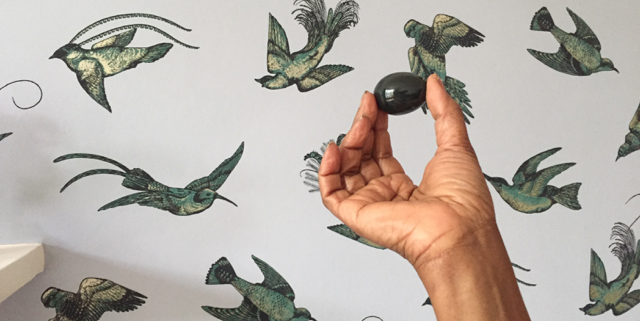One of the many innovations in Sexological Bodywork training is a focus on how we might teach our clients to masturbate in a way which is more embodied, more pleasurable and less formulaic.
To this end, Joseph Kramer, the creator of Sexological Bodywork, invented something called ‘Orgasmic Yoga’.
This is a series of practices to get people to masturbate differently. But to understand these practices, we need to understand where they came from.
From Joseph’s perspective, working largely with men, there were four issues, which had been around for a long time, which more recently had been amplified by something else.
What were the four? They’re familiar:
Firstly, people tended to stumble across masturbation as children, when they carried out the act quickly and furtively and alone. So there was the issue of shame.
Second, once they had learnt how to masturbate, they kept doing the same thing, which over time meant they had to progressively turn the dial up. And the repetition would tend to make it compulsive rather than relaxed and pleasurable.
Third, they tended to be pretty disembodied while they were doing it. They would lose awareness of the rest of their body, or certainly sensations and emotions which weren’t part of their arousal.
Fourthly, they tended to be very focused on the outcome, orgasm, which they would tend to want to reach as quickly as possible.
The newer factor was the ubiquity of internet porn. He would see a lot of men who said they had a porn addiction, spending a lot of time every day watching their computer or phone screen; completely disembodied.
Orgasmic yoga was the cure for both this porn addiction, and for unsatisfying and repetitive -and generally male – masturbation generally. It was based on embodiment rather than based on fantasy porn.
Who it didn’t address was people who had issues with arousal, because that wasn’t the problem he was trying to remedy. But if we forget the problem that Orgasmic Yoga was meant to solve, and blithely universalise it, taking arousal as a given, we risk pathologising those people.
This was an issue Kat and I had to look at when creating our School Of Conscious Touch training programme.
We thought that the assumption that self arousal was straightforward and easy risked shaming and marginalising those students – and future clients of those students – whose sexuality wasn’t like that. So we needed something to go alongside Orgasmic Yoga.
But how could we conceptualise what that might be?
The famously intellectual Taoiseach, Dr Garret Fitzgerald, once said “That’s all very well in practice, but how does it work in theory?”
But that’s the thing: there’s nothing as practical as a good theory, because it helps us constellate our experience differently. It makes us see disparate shapes as parts of the one structure. Patterns appear.
And it’s like that with our innovation of distinguishing two different aspects of our sexuality, The Sexual Body and The Erotic Body, [which I describe in more detail elsewhere],because if we just shoehorn embodiment into our existing perspective on sexuality, embodied masturbation practices come with the same limitations that sensate focus exercises do. And like sensate focus, if all that’s missing is a bit more presence, space and length of time, then orgasmic yoga is ideal. For porn guys, or people with straightforward arousal, it’s ideal. For others, not so much.
For these people, we felt two things were important. First, we had to get them in touch with their Erotic Body, and we worked out several ways to do this. Our identification of The Erotic Body was the theoretical game-changer, because it was it, rather than The Sexual Body, that these people required to engage with first, because the former was much more inclusive of all experience, and far less likely than the latter to provoke feelings of performance anxiety.
Once they were in touch with The Erotic Body, we would then let them wonder creatively in fantasy and memory, noticing what triggered interest, and they could then start to picture -not, at least at first, enact – what an erotic practice authentic to them might look like.
What we’re trying to create with The School is a perspective on sexuality which, while remaining embodied, moves away from the traditional language of needs and drives, and pays much more attention to how each individual constellates their sexuality, which is almost always revealed at the level of fantasy, providing we neither get stuck at the narrative level, either of the fantasy itself, or a general story of what sexuality is.
If you’re interested in working with me, you can contact me here









